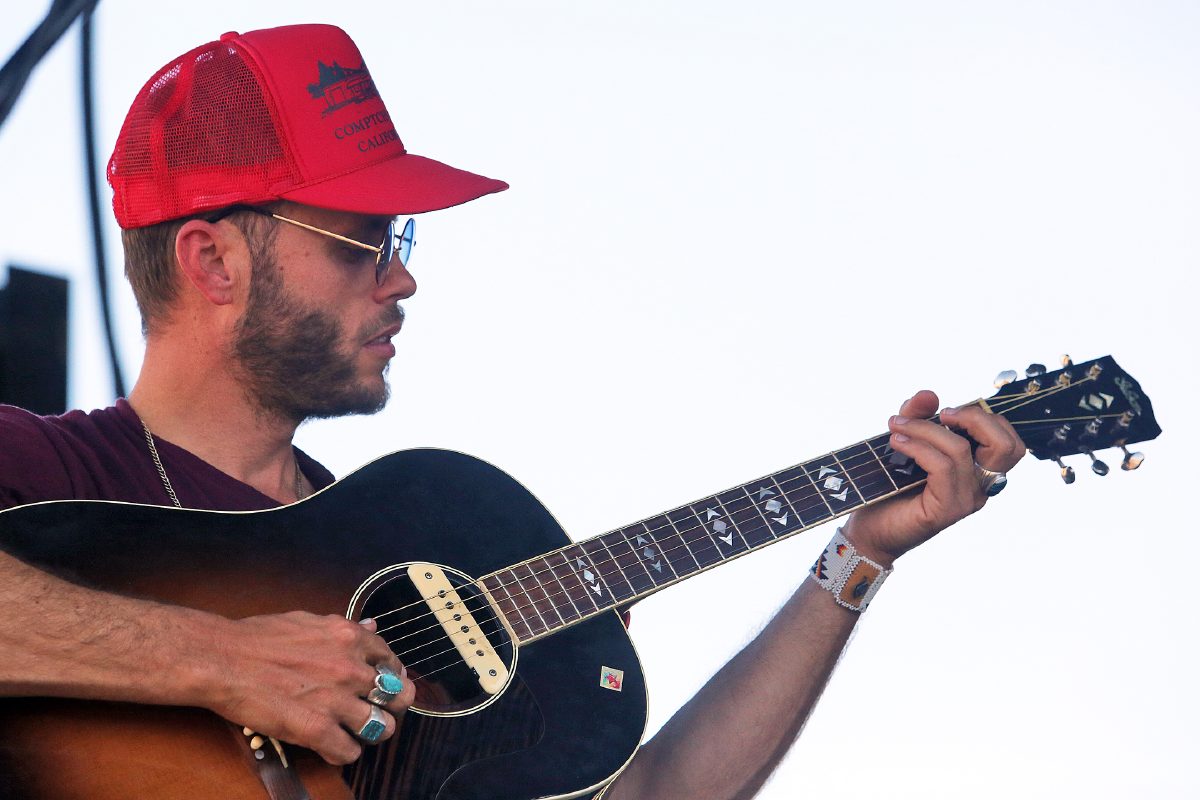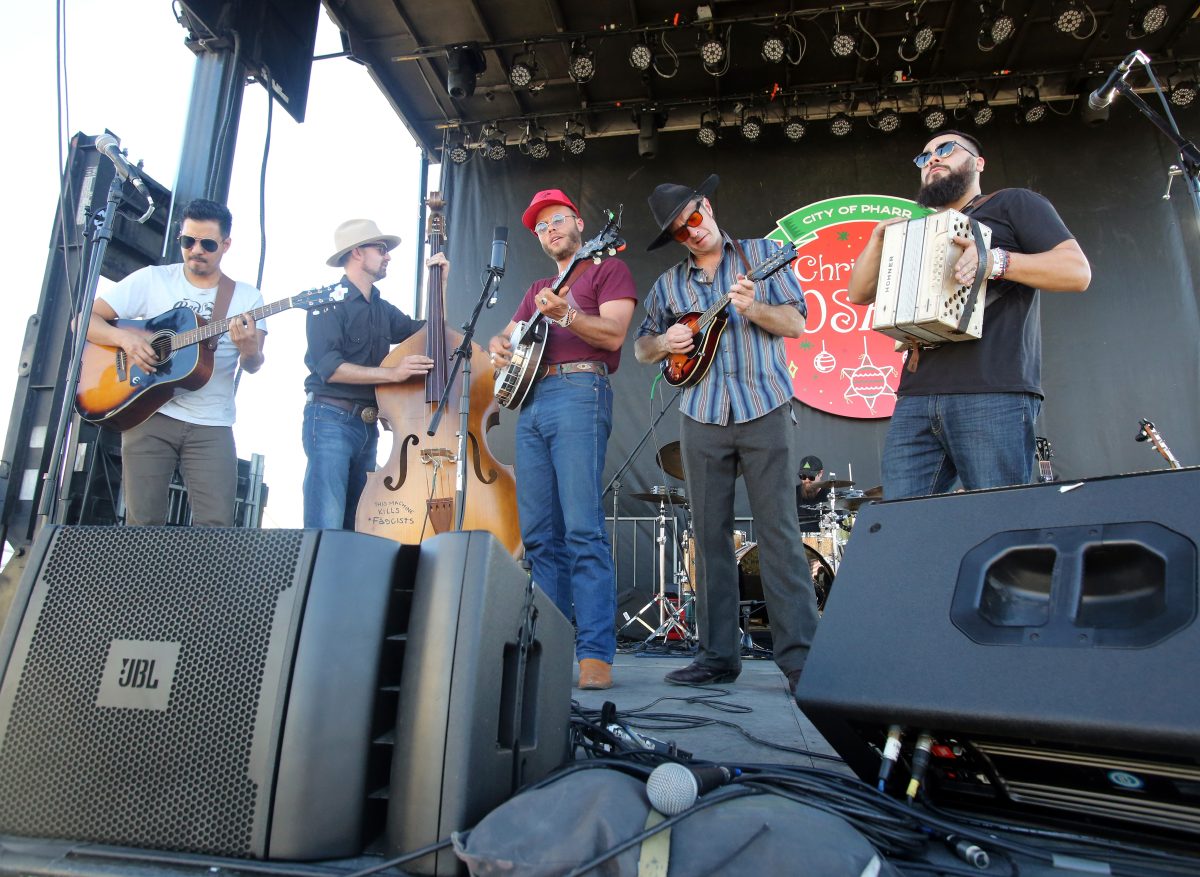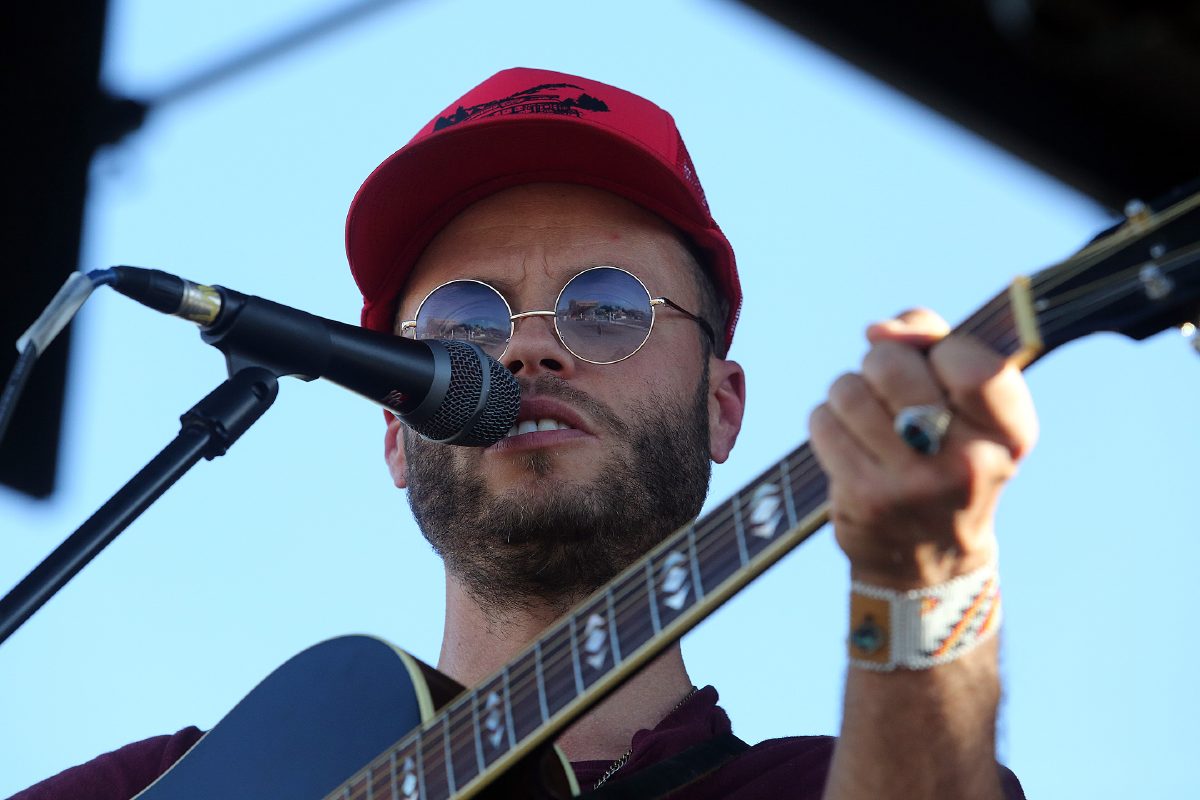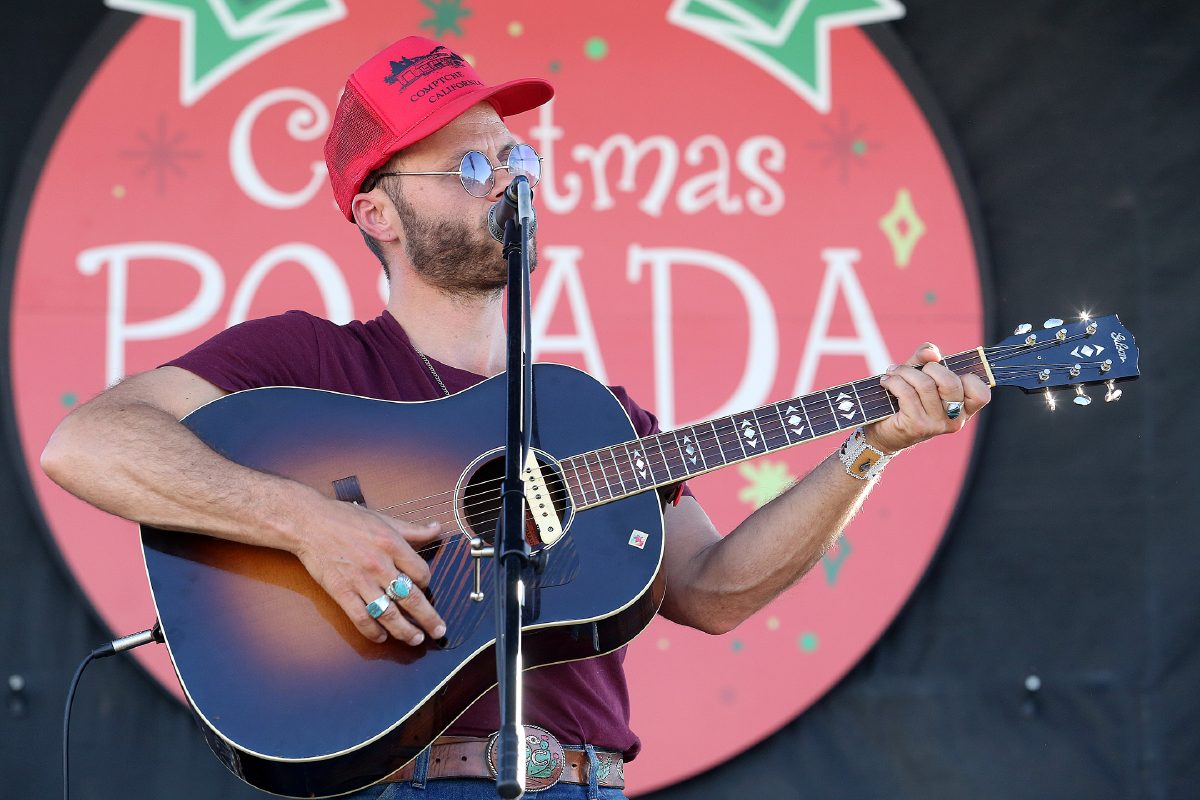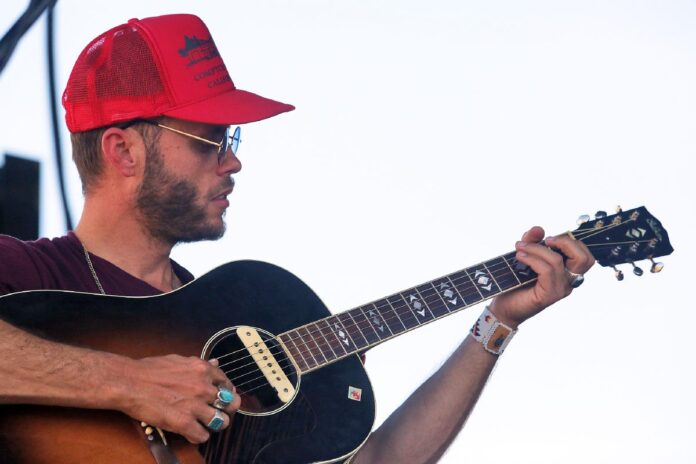
PHARR — “Anybody got a light?” San Benito native Charley Crockett asked, sitting on a bench on the main street of downtown Pharr on an unseasonably warm December Saturday afternoon.
Somebody handed Crockett a lighter and he casually used it to pop the top off a Topo Chico, reclining lazily into the bench while the mineral water hissed and bubbled. He’d finished his soundcheck for Pharr’s Christmas Posada and had just gotten ready for the show.
As usual, he was dressed to the tee: battered cowboy boots, tight-fitting bluejeans, a western-cut vest over a bold blue pinstripe shirt; silver rings inlaid with turquoise graced a few fingers, and he gazed around the sunny street corner through purple-tinted glasses.
A well-worn cowboy hat completed the outfit, of course.
Crockett looked simultaneously out of place and right at home: He was dressed like he had just walked off stage at a Willie Nelson picnic, but the comfortable way he lounged made it seem like he drinks a Topo Chico on that corner most every afternoon.
The fact of the matter is that Crockett is right at home, professionally, for the first time in a long time.
Crockett, 35, was raised in Los Fresnos before moving to Dallas at the age of 10. His mother worked at KVEO as a weather reporter and his father worked in construction and on shrimp boats.
He remembers returning to the Los Fresnos trailer park where he was raised for the first time in years, fearing he wouldn’t recognize it anymore.
“I was born in that old hospital, the one they closed down, Dolly Vinsant, but we lived on Old Port Road outside of Los Fresnos,” he said. “I was assuming they were gonna get rid of all the trailers around the resaca and it’d be all subdivisions and stuff by now, but it ain’t man, it ain’t changed at all. It’s a different trailer with a little newer paint job, but it looks the same. Ours was like off-white, baby blue; this one’s off-white and red.”
Crockett remembers singing with his mother and seeing San Benito’s other most famous musician live in concert.
“I didn’t have a musical family or anything; my momma did sing a lot though, like around the house, so I sang with her from an early age, so that’s probably where I really kinda got it,” he said. “They would take me to see Freddy Fender. My favorite show was the Johnny Canales show, just all the variety of acts he had on the program. That’s my earliest memory of music, Freddy Fender and Flaco and all those guys.”
As a teenager, Crockett picked up a guitar and taught himself to play it, spending most of his 20s living as an itinerant troubadour, singing on street corners from New Orleans to Paris before (comparatively) settling down and releasing his first album in 2015.
“I’m still kinda hitchhiking, cause I owe everybody money,” Crocket said with a laugh. “It really ain’t that much different than when I was kinda hoboing — I’m still standing out in the street all the time; in alleys and bars, standing outside of bars, listening to bands, at gas stations. It ain’t changed much.”
Crockett’s latest album, “The Valley (And Other Biographical Tunes),” is an ode to his upbringing, chronicling his birth on the border and his hardscrabble upbringing through mournful ballads and rollicking honky tonk tunes that Crockett croons emotionally in a low country drawl.
“This is only our second time playing down here, I’m really sad to admit this, but we’ve probably only played down here twice in the last three or four years,” Crockett said. “But once I put out “The Valley,” I knew I couldn’t keep touring without coming to the Valley with that damn record, cause it’s all about this area. I get people online all the time saying, ‘Charley Crockett! You put out a record about the Valley and you ain’t tourin’ here?’ I said, ‘Ma-an we better do something about that.’”
The titular track on the album is a lovesong to the place Crockett thinks of as home the more he travels, complete with sugarcane fields and dirt roads and the birthplace of Freddy Fender: San Benito.
“I got away from all that for a long time,” Crockett said. “As I got older, as much as I was running away, I think maybe I was running away from Dallas, I was never running away from here. In fact, as much as I became an itinerant in my life, the memory of the orchards, the memory of the grapefruit and the sugarcane and all those backroads in there, that’s really who I’ve become in my mind more and more, especially as I’m always living on a bus or I’m in a van overseas.”
Crockett recorded the album a week before having two life saving heart surgeries in January.
Doctors had discovered a heart condition while fixing a hernia Crockett suffered seven years ago while travelling through the mountains in Africa.
“Really man, it was by the grace of the creator that they discovered that,” Crockett said. “They estimated that I would’ve died or had heart failure from that within a year’s time, so I got really lucky.”
Crockett unbuttoned his shirt and pointed to a long jagged scar running down his sternum, a momento from the surgeons cutting him open to install a prosthetic bovine valve in his heart.
The procedure left him feeling like a brand new man, Crockett said.
“I have people that come see me, and I’m a cat cut from a different cloth, so I get a lot of these good ole boys seeing me, saying ‘Charley Crockett, I have just one question: Can you ride a horse?’ I love that,” Crockett said. “First of all, yes I can ride a horse, damn right I can ride a horse. But secondly, now what I can say with a hundred percent accuracy, that I wasn’t raised up breakin’ horses or ridin’ bulls, but I am a cowboy because I’m part cow! I am a cowman!”
Although the procedure went well, the situation was serious enough that he felt he had to record “The Valley” and the stories it told before he went under the knife.
“There’s no part of America like the Valley, man. People in Texas don’t even know about this place. If they haven’t been down here, they don’t know,” he said.
Crockett said he intends to make more frequent tour stops in the Valley in the future.
“I wanna do as much as we can down here and really be involved,” he said. “I like the city events, all the local stuff, I like to play with a lot of local acts as much as we can down here and be a part of it.”
A self-proclaimed gypsy, Crockett’s certainly got the credentials to backup that claim. His journey has taken him across the Atlantic and through three continents. He rode in freighters and he rode in cars; he’s played on sidewalks and he’s played in bars. The hard times he’ll tell you about seem almost unbearably difficult; the good times sound almost too good to be true.
Sometimes, you’ll catch yourself wondering if it’s some sort of embellishment, if maybe the story of Charley Crockett is as much of a tall tale as the story of the legendary frontiersman family lore he said is his distant relative.
Something, however, in the sincerity of Crockett’s voice stops you from doubting him. Crockett’s no poseur; he’s a man with a fascinating story that finally has a stage to tell it from.
Stepping in front of the crowd in Pharr on Saturday night, Crockett told that story to an audience who understood it (the first part, at least) better than anybody.
The style of the songs reflected Crockett’s travels: bluesy ballads influenced by his time in New Orleans; folk songs of the variety that have been popular with other American hobos and vagabonds for the past hundred years; toe-tappin’ country licks that belong in a Texas dancehall.
Crockett’s a performer as much as he is a musician: he dances and stomps across the stage, shuffling his boots and flashing toothy smiles at the audience. Occasionally, he holds his guitar vertically, parallel to his body, flailing it wildly and almost shouting out his songs.
He has a full band now, but Crockett still plays like a busker on a crowded city street trying to make enough of an impression to get a passerby to toss a buck into his guitar case.
Between songs, Crockett takes a break, pausing to talk about the place he considers home.
“Everywhere I go I carry the memory of the Valley in my mind, it’s what keeps me going,” Crockett said.
Early in the performance, Crockett strums his guitar and begins to sing.
“I’m from San Benito, Texas,” Crockett moans, playing the first chords of “The Valley.” The crowd starts whooping and hollering; evidently, there’s plenty of people from San Benito in the audience.
A kid in the crowd, maybe 5 or 6 years old, starts tapping his foot along with the music. This writer couldn’t help but wonder if Charley Crockett tapped his foot along with Freddy Fender and the Johnny Canales show 30 years ago.
Crockett reaches the chorus:
“If you ask me where I’m going
I can’t tell ya, ’cause I don’t know
But in my mind I see the Valley
You should see the way it glows”
The lines are reminiscent of something discussed sitting on that bench earlier in the day, not 100 feet from where Crockett’s currently stomping his boots.
“Where ya going, Charley?” The Monitor asked.
“Back up to Austin,” Crockett shoots back quickly with a sarcastic smile.
“Nah, I’m just joking. Where am I going?” he repeats, thinking hard. “I don’t know, man, I don’t know where I’m going, but I’m telling you: I’m not gonna stop doing this till my heart gives out.”

